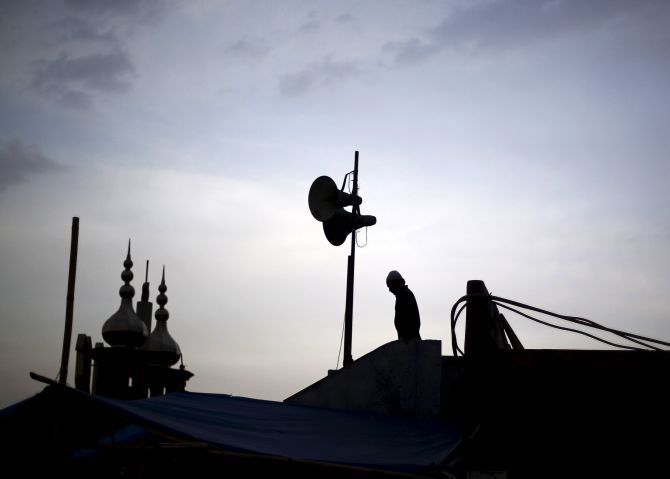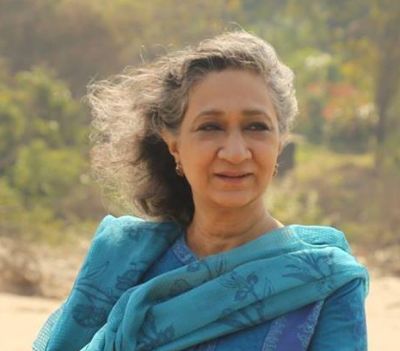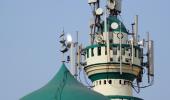'Noise pollution is a health issue, it is not a religious issue.'

Singer Sonu Nigam created a furore on social media on Monday morning after he vented his anger against the morning azaan (the Muslim call to prayer) through loudspeakers.
Sumaira Abdulali, below, left, a Mumbai-based noise pollution activist, has been working on such issues for years.
Following Nigam's outburst, she spoke to Rediff.com's Syed Firdaus Ashraf on the use of loudspeakers for azaan and other religious purposes.
Sonu Nigam has complained about the morning azaan call through loudspeakers. What do the rules say about using loudspeakers at religious places and for religious events?
The rule is the same for everyone. There must be no loud noise between 10 pm and 6 am. The rule must be adhered to as it is a (Bombay) high court order.
The Supreme Court has also stated at various times that religion should not the reason to break noise rules.
The (Bombay) high court has also said that a religious place is a silent zone and you cannot use a loudspeaker there.
Sonu is completely right on the issue, I support him.

Why doesn't the government take action against azaan through loudspeakers?
Exactly. In spite of court orders, the government is not taking any action, and that is the unfortunate part.
Contempt notices are being heard now. Anybody who feels that noise pollution levels are not being observed must go to court and file a contempt notice, including Sonu.
In Navi Mumbai, a person went to court and stopped the morning azaan on loudspeakers.
There are certainly other examples. In Sewri (south Mumbai), they stopped azaan through loudspeakers in the morning.
In fact, they are supposed to remove loudspeakers (from mosques). The mosques also cannot turn the face of the loudspeakers towards the outside.
Typically, mosques have loudspeakers right on top of the minarets and the sound spreads beyond their own premises, which is not allowed.
You can use a loudspeaker indoors in such a way that the sound does not go out.
It was implemented for Easter and Good Friday prayers this year. It has to be implemented across the board for all religious places and events.
Is this rule limited to the morning prayers only or applicable all day?
You cannot use a loudspeaker in a silent zone.
All religious places are silent zones.
Why don't people complain against the morning azaan?
Because people think nothing will happen. But there is no point in just grumbling. You must file a complaint.
The other problem is that the people who complain get fobbed off by the police, which tells them that it is a sensitive matter or that it will create a law and order situation.
Or someone says you stop something else first and then talk about azaan.
But the law is the same for everyone.
People must stand up and make sure this law is implemented. You have to stand for it. The court has clarified it.
Do you think this takes a communal turn because once you target azaan, people start asking about other religious places too?
There is no communal angle to it. Noise pollution is a health issue. It is not a religious issue.
People try to bring a communal angle into it because it gives an excuse to every community to not implement the rule. They always point the finger at others first.
Every community is doing the same thing, stop the other one first, then we will comply.
Consequently, everyone is suffering.
In what way is this a health issue?
If an azaan call is made at 5 am, it interrupts people's sleep at that hour.
Even in the daytime, not only azaan, but any kind of noise affects your hearing. This is a fact well documented by the World Health Organisation.
India is one of the noisiest countries in the world.
Indians suffer hearing loss more than people in any other country. This is proven.
Apart from this, noise pollution also affects blood pressure and mental health, and also causes heart problems.
Where there is a loud noise, people get irritated.
Sleep deprivation is a form of torture. Noise pollution affects all of these. We need to realise that.
Is there a history of placing loudspeakers at religious places?
If one says that the use of loudspeakers is traditional, then this tradition began only in the 20th century, because loudspeakers did not exist before that.
Putting up loudspeakers is forcing people to hear what you say. It is like the promotional calls you receive from various companies.
I remember when I was growing up, political leaders used to take a megaphone and force you to listen to their messages.
By and large it became a part of every celebration and function and many of these functions even today are politically motivated.
There is a lot of money involved and a lot of political power to gain and people are being misinformed that this is a part of our tradition.
The attitude that it is fine for a little while is not correct.
If everyone starts doing it for little while, it actually goes on continuously.
If you target azaan, the Muslims say you are targeting only them...
I am not saying stop the use of loudspeakers only for azaan, but also for Ganpati (processions) and everything else which creates loud noise because it affects people's health.
We need to protect our health first.
There are patients, elderly and infants around you. You cannot harm their health by noise pollution.
If I attack you with a weapon, I will be put in jail.
But if I attack you by making you sick through loud noise, people say it is okay for a little while.
Producing loud noise is a form of attack as it directly affects your health.
You have been raising a voice against noise pollution during Ganesh Chaturthi. Has there been any change in the situation?
Last year Mumbai was the only city where the noise level came down (during Ganesh Chaturthi).
Though it was still above the permissible limits, it came down (as compared to previous years).
Similarly, because of the high court orders, noise pollution levels came down on Diwali too.
Very interestingly, I received a lot of support from the Muslim community. I thought they will say how can you tell us (to remove loudspeakers)?
But a lot of Muslims came out and spoke against the use of loudspeakers during festivals like Eid.
People thanked me (for getting loudspeakers removed) during Eid last year.











 © 2025
© 2025